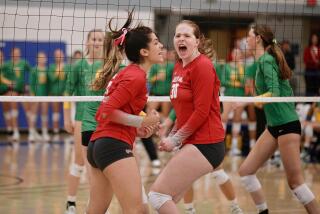Spiking the Problems : Wizards Overcome the Sound of Silence
- Share via
Jodi Tu stood inside the small, stuffy gym at Chatsworth High School. Occasionally she nodded her head and gestured with her hands while watching her volleyball team warm up for practice.
Tu, of Palos Verdes, couldn’t hear the thumping produced by white balls hitting the orange gym walls or dull wood floor. Nor could she hear the sounds made by the hands that slapped the balls. And Tu couldn’t hear the groans or hollers of the enthusiastic players.
She has to settle for watching, but she’s not alone in her silent world. The nine members on the Valley Wizards, an American Deaf Volleyball Assn. women’s team, are unfamiliar with those sounds.
Despite their inability to hear or speak, however, they’re competitive in what is normally an extremely vocal game.
“It’s not easy,” said middle blocker Lynn Odom, who lost her hearing to nerve damage six years ago. “It was very hard for me to adjust. I was used to hearing the ball and playing with a team that screamed and called out plays.”
Odom speaks clearly and can read lips. This is her second year playing for the Wizards, one of five ADVBA teams in Southern California. There are about 200 other teams in the United States.
The Wizards meet at different locations three times a week to practice and scrimmage, often against hearing teams.
Today and Saturday starting at 8 a.m. they will participate in the annual ADVBA national tournament at El Camino College. The event will feature the nation’s top deaf teams--seven women’s and eight men’s.
Last year the Wizards won the women’s title in Chicago. Tu, the ADVBA chairman, played on that team and accompanied the national team to New Zealand for the World Games. This year the 28-year-old has more of an administrative role with the organization, which was started in 1985.
Tu still attends all of the Wizards’ practices and often works out with the team, but she’s more of a manager. She said through an interpreter that deafness is invisible and often not seen as a handicap.
“You can’t tell that we’re handicapped just by looking at us,” Tu said. “It’s not clear right away, so it seems like there’s nothing wrong. It seems like we’re just a regular team.”
But anyone who knows volleyball, an action-packed sport with lots of talking among players and coaches, knows that deaf teams have disadvantages over hearing teams.
Wizard Coach Colleen Garner, who can hear, claims there are many differences. She was a setter at Burroughs High School and at Glendale College and says coaching a deaf team requires a lot of adjusting.
“We spend a lot more time in the transition of the game,” she said. “We practice going from offense to defense and using drastic visual signs.
“At first it was very frustrating because, unlike a hearing team, you can’t just scream out a play and they can’t just say ‘I got it’ or ‘yours’ when the ball comes to them.”
Setter Linda Murashige knows from experience. She played volleyball at Gallaudet University (a school for the deaf) in Washington, D.C., mainly against hearing teams such as George Washington, Maryland and Georgetown.
She was also a member (1973, 1977, 1981) of the national team that represents the United States in the World Games for the deaf every four years.
“They had a big advantage over us,” Murashige said of her National Collegiate Athletic Assn. opponents. “But we loved it. We loved to play them and show them that we could beat them.”
It doesn’t matter to the Wizards that they can’t hear or speak. They just want to compete in the sport that most of them grew up playing.
Murashige, 34, even came out of retirement at Tu’s request to play for the team. Like the rest of her teammates, she’ll play a tough but silent game at El Camino.


